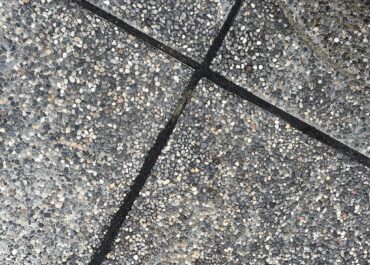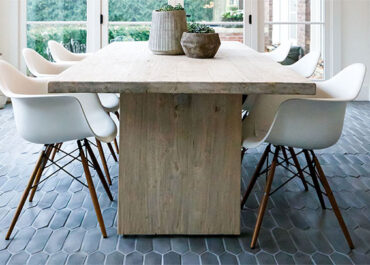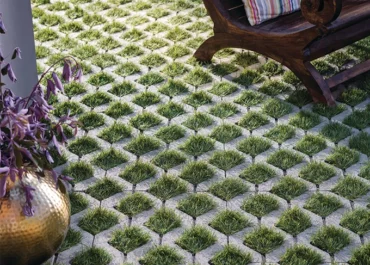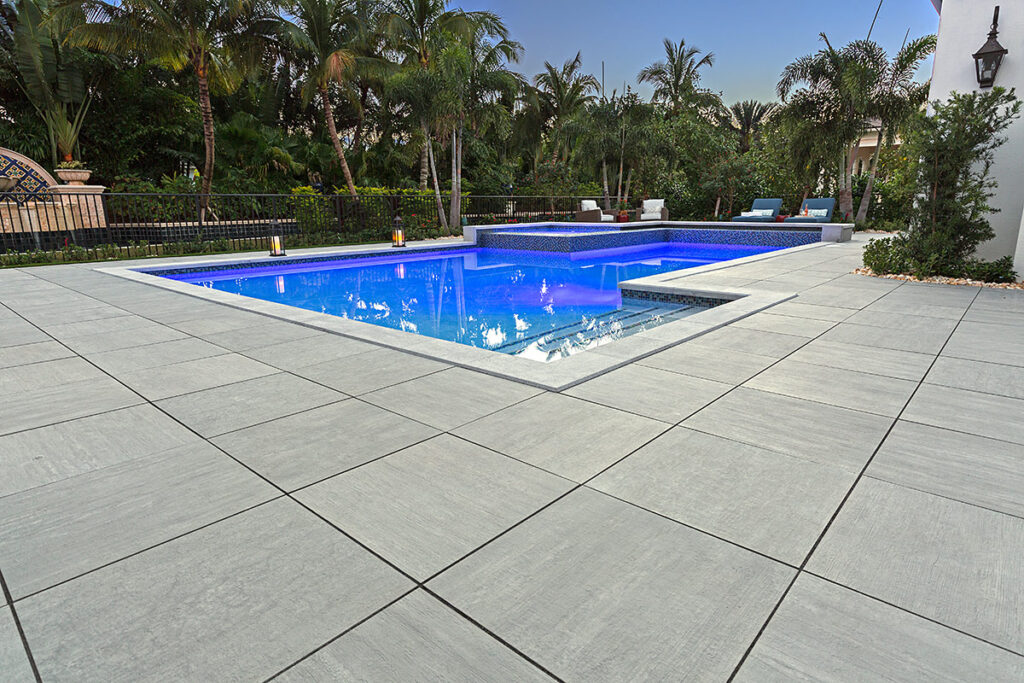
A beautiful porcelain paver patio is the dream of many hardscape aficionados around the globe. Also, pools are always synonym of elegance, being the centerpiece of many hardscape projects. So, if you mix the two together, you’re to end up with a marvelous hardscape project. So let’s talk about porcelain pavers for pool deck.
Porcelain, in case you don’t know, is nowadays considered one of the best options of paver material. Even better when applied to poolside installations. We want to explain to you why porcelain is such a good choice for a pool deck, what options do you have, and talk a little about how to maintain it.
So let’s get right to it.
Porcelain Pavers for Pool Deck: What Makes Them So Good?
The key to understand why porcelain is so good of a paver for a pool deck is understanding its manufacturing process.
Porcelain is created by mixing raw materials, like clay and kaolinite, with water until a sand-like consistency is reached. This material then goes through a drying process, in which the excess water is removed.
Following that, the mixture is put into a mold, where it is submitted to extreme pressure to receive its shape. It is at this pint that the porcelain is colored and printed to almost any pattern imaginable.
The colored and printed material is then cooked under temperatures as high as 2500 °F, in order to be glazed and remove any remaining moisture. Most of what makes porcelain unique happens at this stage.
When submitted to these high temperatures, the minerals on the porcelain go through what we call a vitrification process. This process melts the minerals, creating a form of protective glass around the porcelain.
For that reason, porcelain pavers are extremely non-porous resistant materials.
Porcelain pavers are a perfect choice for pool decks due to their non-porous nature. They are natural impervious and don’t absorb water or spills. This is even more important on a pool setting, since the pool water usually has chemicals that can be harmful to the surrounding pavers.
Porcelain Pavers: Options and Applications
There are currently several brands of porcelain paver in the market, but the most reliable one is Belgard.
Belgard products are developed with the most advanced technology in the market and are synonymous of quality and reliability across the industry. Their porcelain pavers are not different.
Belgard currently works with an astonishing 18 different collections of pavers. These collections are designed to fit every style, from rustic to modern. You are sure to find a porcelain paver that fits your project when working with Belgard.
The high resistance and non-porosity capacity of porcelain makes it a top choice for heavy load factory flooring and high vehicular areas.
That might sound strange to hear, since the first things that pops into our head when we think of porcelain is the thin ceramic used in tableware.
While the material is the same, porcelain pavers are very thick, and therefore very resistant. They come in two variations of thickness: standard and 20 mm.
Standard thickness ranges from 9,5 to 10 mm. Those are usually designed for indoor use.
For outdoor use (but also possible to use indoors) the 20 mm variation is required. This heavier and more sturdy variation is perfect for the heaviest of activities.
Maintenance of Porcelain Pavers
Porcelain pavers are one of the easiest to maintain, if not the easiest.
Since it’s non-porous, it does not require sealing. By that alone, it surpasses many options maintenance wise. Not having to seal your pavers is a huge advantage. Sealing can sometimes be a costly and complicated business, and the fact that porcelain does not need it says a lot about the quality of the material.
Because of this impervious nature, porcelain is really resistant to stains that can come from dirt and biological material.
For light foot traffic areas, sweeping up porcelain every day and moping it with warm water and mild cleaning agents once a month is more than enough to ensure it remains clean and pristine.
For high foot traffic and vehicular areas, moping it with a damp cloth at the end of the day is a good call, as well as a deeper mop with warm water and mild cleaning every 15 days.
Always use pH-neutral cleaning products with porcelain. Never use acidic products, and don’t fall for the common misconception that bleach and vinegar are good cleaning agents for pavers.
White vinegar, sometimes, when diluted with water, can help, but even that is riskier. With the amount of environmental friendly cleaning options we have available at the market today, there’s no need to risk the integrity of your pavers using those products.
Professional Help With Porcelain for Pool Deck
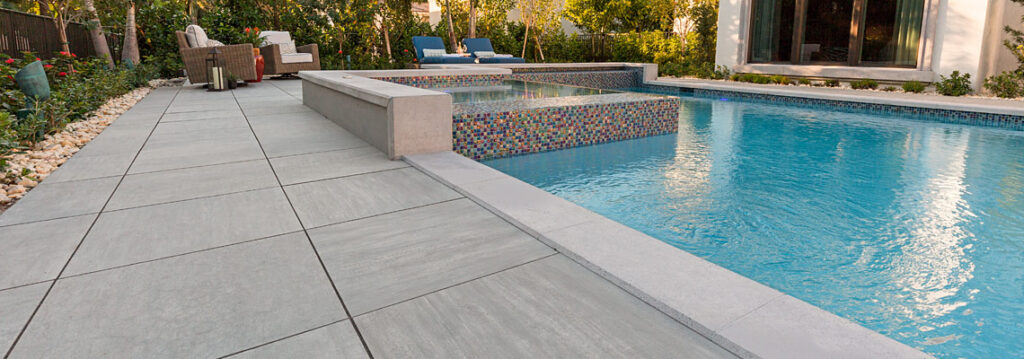
We recommend you always look for authorized dealers when acquiring Belgard pavers. These professionals can help you acquire the best porcelain pavers in the market and make the best choice of porcelain pavers for a pool deck.
They can even help you with the installation and maintenance of said pavers. The installation of porcelain pavers is a little more complicated, since it is a very heavy material. We highly encourage you to get in contact with professionals before deciding to tackle it as a DIY project.
If you happen to be around the Sarasota and Manatee counties, we here at Eagle Pavers can help you get the perfect porcelain pavers for your project. For over 14 years, we’ve been serving the area with Belgard pavers, with a high satisfaction rate from our customers.
Give us a call anytime at +1 941-210-4192 or email us at sales@eaglepavers.us. We would be happy to hear from you and help you with any paver supply need you might have.


